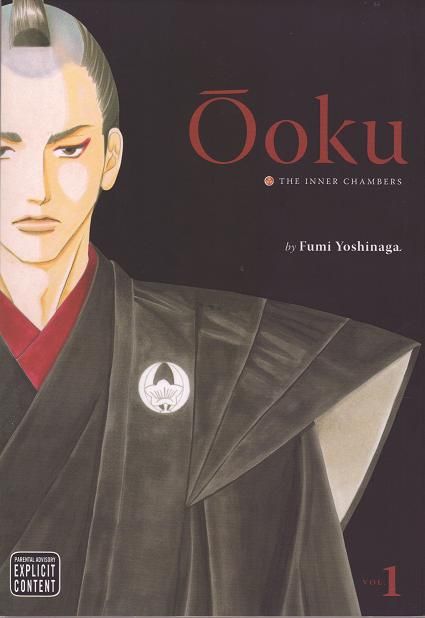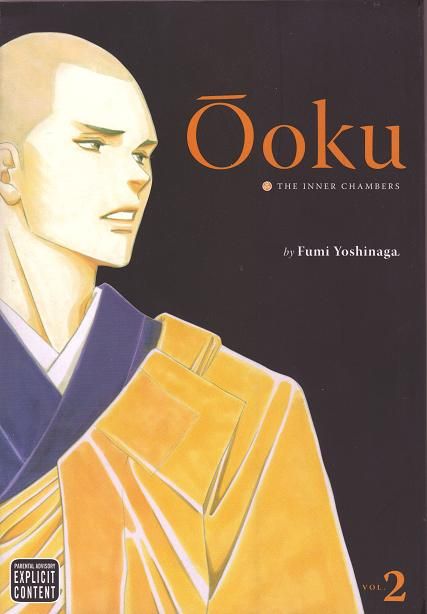This only has two volumes out so far, so it's not further up on the list, but dang, it's good.
The latest series I'm reading is an alternate history manga, which means I ought to love it, oughtn't I? I love the history, and I love the alternate history.
Who doesn't dig Harry Turtledove? So Ooku is right up my alley, but if you're not a fan of alternate history, you shouldn't let that bother you, because it's a tremendous story even if you aren't a big fan of the genre. Ooku is by Fumi Yoshinaga, translated by Akemi Wegmüller, and lettered by Monlisa De Asis. It is brought to us by the kind folk at VIZ Media (it's actually from VIZ Signature, because it's all hoity-toity!).
Here's the set-up: in 1632, during the early years of the Tokugawa Shogunate, a mysterious plague swept Japan. Called the redface pox because it manifested with red pustules on the face, it affected mostly young men and killed almost everyone who contracted it. Within a few years the male population of Japan plummeted, and by eighty years later, the men numbered about one-fourth of the female. This causes some problems, as you might expect. The women take charge, as they must, and men become a highly-valued commodity. Poor women have no hope of marrying, but they can "rent" a man to impregnate them. Meanwhile, we find out early on that the shogun keeps hundreds of men in the Ooku for her pleasure. The series revolves around stories of these men.
Yoshinaga does some very nifty things with the book in blending fact with fiction. The Ooku actually existed, but stocked with females rather than males, of course. In the series, women become shoguns, but no one knows about it for some time.
The closure of the country in the 1630s (which lasted until the 1850s) is explained by the shogun not wanting to allow news of the lack of men to leak out, as she believed Japan would become ripe for invasion (the actual policy, simply, was a response to the influx of Catholic missionaries and other colonial influences). When you're writing alternate history, you have to blend in some actual historical stuff, as it helps embed you further into the world. Yoshinaga does this very well.
In the first volume, Yoshinaga takes us to 1716 and tells the story of Mizuno Yunoshin, who asks his family to be allowed to join the Ooku instead of marrying. Mizuno has sex with any poor women who asks (without charging them), but he has an older sister who is not yet married. His family is not poor but they can't afford a dowry for any groom, and Mizuno decides to enter the Ooku because his family will receive a stipend. Off he goes, leaving his childhood sweetheart, O-Nobu, behind. Once he enters the Ooku, he can never leave, but he doesn't see it as a huge burden.
Mizuno works his way up the complicated ladder of the Ooku's social structure until he joins the "grooms of the bedchamber" - a man who is allowed into the shogun's presence and might be allowed to lie with her. The new shogun, Yoshisume, picks him to be the "secret swain," the first man she has sex with, which, according to ancient tradition, means that after the lovin', he needs to be executed (he "caused injury to her person" because he deflowered her, even though Yoshisume isn't a virgin).
This is a bit of a problem, because Yoshisume has no interest in following ancient traditions and Mizuno is just a swell guy. Meanwhile, Yoshisume takes an interest in why the women in charge of the country take titles like "lord" and adopt "manly" names, so she seeks an old scribe who might know. He tells her that women weren't always in charge ... once MEN ruled the roost! Shocking! This leads into volume 2, which takes us back to the transitional period eighty years before.
In volume 2, we see the wet nurse of the shogun who ruled when the plague struck, trying to figure out how to run the country now that the men are dying off. Arikoto, the abbot of a monastery, is summoned to the Tokugawa court in Edo. There, Lady Kasuga, the wet nurse, informs him that he is never allowed to leave and will become the "catamite" for the shogun (who is a female, but Kasuga doesn't reveal that, hence the use of the term catamite). He resigns himself to being a prisoner, and then he discovers that the shogun is actually a woman (well, teenaged girl). Iemitsu is the illegitimate daughter of the last male shogun, and when he died (he was, ironically, not interested in women and only impregnated one through rape in order to "prove" that he was a real man), she was given his name and placed in his position. She's an unbelievably spoiled girl, as Kasuga, who loved her father dearly, sees only him in her.
The second volume is all about Arikoto's relationship with her, which is quite rocky even though we're fairly confident they will eventually end up together (but will they ...?).
Yoshinaga is obviously going to tell stories from the entire time period, all of them forming a grand narrative of the world she has created. If there's an underlying story, it hasn't emerged to this point, as the two volumes tell stories that are separated by so many years. What we get, instead, are two absolutely wonderful yet different love stories. Romance is hard to do in fiction, because it's too easy to fall into rom-com cuteness or throw idiotic barriers between two people who are obviously destined to be together. Romances actually work better when they're set in the past, because there were real social barriers between people back then, much moreso than there are today. The men in Ooku, for instance, aren't free to choose their mates because they're such valuable commodities. In this way, it's much like the actual history of women, who were (and are, in some places) considered property to be disposed of by their fathers in the way that will accrue more value to the family.
So Mizuno cannot marry the woman he loves, making entry into the Ooku his only option. His love for an unattainable woman colors every action he makes inside the Ooku and, in a roundabout way, brings him respect. Meanwhile, Arikoto is confronted with a woman who, although she's supposed to be all-powerful, is as much a slave as he is. Tragedy in her past has made her bitter toward both the shogunate itself and men in general, but through an accident of birth, she's trapped as surely as the men in the story are. In both stories, Yoshinaga allows events to unfold slowly and naturally, giving the climaxes of both stories much more power. These are tremendous love stories, and it's nice to see them.
There are a few things wrong with the series. Mizuno and Arikoto are both so, SO noble that it strains credulity at times. Everything they do is perfect, and although it doesn't become too grating, it's still kind of difficult to believe. And while the art is mostly good, Yoshinaga does slip into what I call "stereotypical manga" art at times, which means the characters have exaggerated facial expressions that don't fit well with the tone of the book. In less "serious" manga, that kind of thing is an interesting way to convey emotion, but it's unnecessary in this series, and is mostly jarring.
Yoshinaga does a magnificent job with the historical detail of the period, and the occasional goofy expressions pushes me right out of the story.
Those are minor criticisms, though. As well as being wonderful love stories, Yoshinaga does a fantastic job showing how Japan deals with the plague, how they try to keep it under wraps, and how gender roles are switched. Yoshinaga argues that gender roles are programmed by society, as the men in the Ooku are as coquettish as any group of women might be. It's a nice observation on the way society views men and women, and while I don't know if it's accurate (I've never had the chance to observe a group of a few hundred men or women in isolation, so who knows how they would act?), it's still a clever way to show how this world is different yet very much the same as ours. Yoshinaga makes it very believable that the men in the Ooku would be as catty as the women would be. While the stories of Mizuno and Arikoto are the main ones, the swirl of intrigue around the Ooku itself adds a great deal of depth to their trials.
As there are only two volumes of Ooku, The Inner Chambers out so far, it shouldn't take you long to catch up! And I recommend that you do, because it's a fantastic series. I'm very keen to see what Yoshinaga has in store for the rest of the series.
Next: Well, that's going to be difficult. I'll have to figure that out!



